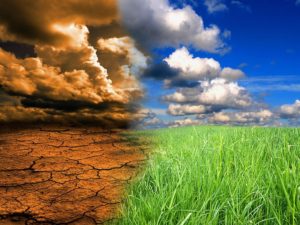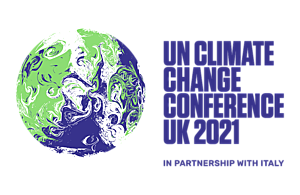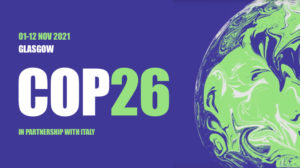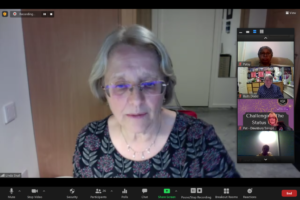 On Mon 22 March we had an engaging evening on Zoom – “How can Women lead on Reducing Carbon Footprints?”
On Mon 22 March we had an engaging evening on Zoom – “How can Women lead on Reducing Carbon Footprints?”
The event was led by Soroptimist St Albans Club Member Linda Shall who is an experienced Carbon Literacy Project trainer and a member of the Club’s “Planet Team”.
 During the evening we investigated climate change and how we, as women, can lead on carbon footprint reduction. The Aims and Objectives of the event are at the bottom of this piece.
During the evening we investigated climate change and how we, as women, can lead on carbon footprint reduction. The Aims and Objectives of the event are at the bottom of this piece.
Everyone who registered for the event was asked to calculate their Carbon Footprint beforehand. For details of the World Wildlife Fund’s Carbon Footprint Calculator we used and other resources from the evening please scroll down further.
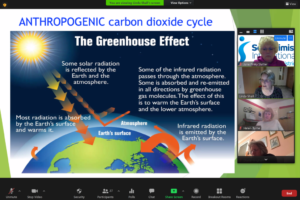 Please click here to download and read Linda’s powerpoint presentation:
Please click here to download and read Linda’s powerpoint presentation:
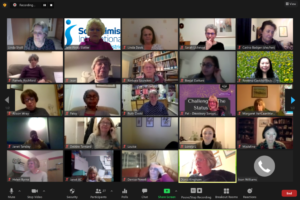 Precis of feedback from 22/3 Speaker Meeting – Carbon Footprints
Precis of feedback from 22/3 Speaker Meeting – Carbon Footprints
The Breakout Groups discussion questions were –
· In what ways can and do women influence household footprints?
· What lifestyle changes can reduce toeprints?
The Breakout Groups based their feedback on the 4 toeprints developed by the World Wildlife Fund (WWF).
Food
5 breakout groups summarised their discussions and the most talked about World Wildlife Fund toeprint that it was thought women can and do influence decision-making around is all aspects of food, as follows –
· Provisioning – buy local, eat out less, grow-your-own foods
· Diet – vegetable box deliveries, organic, less meat, more vegetarian/vegan foods
· Waste – compost more, plan meals
· Packaging – buy unpackaged foods, reduce plastic in shopping trolley
Home energy
The second most discussed toeprint that it was thought women can and do influence decision-making around is home energy, as follows –
· Consumption – the air temperature of the home; low-energy lighting and turning off lights; lower temperature shower water; installing a smart meter; the level of home insulation; not leaving appliances/products on standby; offsetting carbon emissions
· Supply – whether supply is generated from renewable sources rather than fossil fuels
· Household v dwelling size – several comments were made about the difficulty in reducing the carbon footprint of smaller households living in larger homes. Turning the heating down in little-used rooms is not always emissions-effective if maintenance renovations or repairs result
Travel and miscellaneous
Travel was acknowledged as the toeprint that saw the biggest decrease in personal carbon emissions during the COVID restrictions in 2020. Several members were surprised at the difference that NOT flying, specifically, had made to their carbon footprints, compared to previous years. Consequently, they identified ways they might chip away at their carbon emissions post-lockdown, as follows –
· Holiday destinations requiring fewer flights; offsetting journeys, especially when flying
· Commuting by public transport rather than car
· Switching to lower fossil fuel-powered cars – hybrid, electric etc
· Not replacing their car as often, to reduce the emissions embodied in new products
· Cycling and walking more for local journeys
Some issues were raised for which the WWF have not developed a toeprint, but it was thought were worthy of attention by women as ways to reduce personal carbon emissions, as follows –
· encouraging pension providers to divest from investing in fossil fuel industries; managing money through sustainable banks and investment funds
· being aware of how influential they are on the children they raise eg through the values they live by etc
Finally, the point was made that women are making decisions all day, every day that subconsciously influence their household’s carbon emissions. Becoming conscious of their decision-making impact might encourage women to more proactively reduce their household’s emissions, which, if replicated across c19 million households in the UK will contribute towards achieving its overall carbon footprint and slow the impact of climate change.
Women joined us locally and from farther afield, including Manchester, St Austell and California! Feedback at the end of the event from some of our 27 attendees were: “This was excellent thank you Linda and SI St Albans! I learnt a great deal and it was lovely to connect with some new people. I’m going to try and get our carbon footprint down even more this summer. Thank you so much!”
“Thank you Linda, Helen and Jane. Very insightful!”
“Great session, thanks Linda!”
There will be a follow up session on Zoom on 27 September 2021 to check on progress.
Resources from the presentation
The World Wildlife Fund carbon footprint calculator https://footprint.wwf.org.uk/#/ – After calculating your carbon footprint there are offered ‘tips’ to help reduce carbon emissions for each of the 4 toeprints, or categories. WWF now also has a My Footprint App you can download to set yourself Environmental challenges: you can see challenges other people have created and interact with friends.
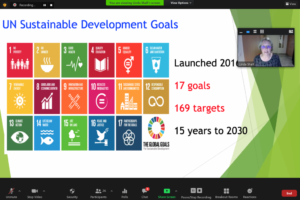 The United Nations Sustainable Development Goals https://www.un.org/sustainabledevelopment/sustainable-development-goals/ – The Sustainable Development Goals or Global Goals, which lie behind all Soroptimist objectives, are a collection of 17 interlinked global goals designed to be a “blueprint to achieve a better and more sustainable future for all”. This link is to a video called “The Good Life Goals” that summarises the 17 goals and 169 targets – https://youtu.be/bbrYODvkvGk
The United Nations Sustainable Development Goals https://www.un.org/sustainabledevelopment/sustainable-development-goals/ – The Sustainable Development Goals or Global Goals, which lie behind all Soroptimist objectives, are a collection of 17 interlinked global goals designed to be a “blueprint to achieve a better and more sustainable future for all”. This link is to a video called “The Good Life Goals” that summarises the 17 goals and 169 targets – https://youtu.be/bbrYODvkvGk
Ethical Consumer website and magazine – www.ethicalconsumer.org – Ethical Consumer Research Association Ltd is a British not-for-profit publisher, research and campaign organisation which publishes information on the social, ethical and environmental behaviour of companies and issues around trade justice and ethical consumption. The magazine is available to buy from good newsagents such as W H Smith, or by subscription.
Book – The Sustainable(ish) Living Guide by Jen Gale – www.asustainablelife.co.uk – The book was published in April 2020 and is a guide that encourages people to pursue more sustainable living without having to be a hard-core environmentalist and perfect in every possible sustainable way! Jen blogs and creates a podcast – checkout her website.
To encourage members and visitors to reduce their Carbon Footprints by reflecting on their impact on the climate and on women across the globe through an understanding of climate change science and carbon footprints, and by providing some suggested methods, to help them identify changes they can make and to understand the particular role women can play in carbon emission reduction.
Objectives:
- To explain the science behind climate change and the impact it is having, especially on women and families.
- To encourage attendees to calculate their own carbon footprint(s) beforehand using the World Wildlife Fund Carbon Footprint Calculator, and bring their results with them ( if possible calculating it twice changing their entries so they can see their impact taking into account the pandemic).
- To enable a discussion of the differences between individuals’ results in Breakout Groups and begin to share ideas on how to make changes to reduce the impact.
- To provide suggestions for changes which can be made to reduce carbon emissions and highlight the unique role women can play in leading these changes.
- To invite attendees to join a follow up session on Zoom on 27 Sep 2021 to share progress
There was no charge for the event but donations of more than £60 were received for the Woodland Trust and other environmental organisations supported by the Club.
This year the UK is hosting the 26th UN Climate Change Conference of the Parties (COP26) in Glasgow on 1 – 12 November 2021 ukcop26.org


